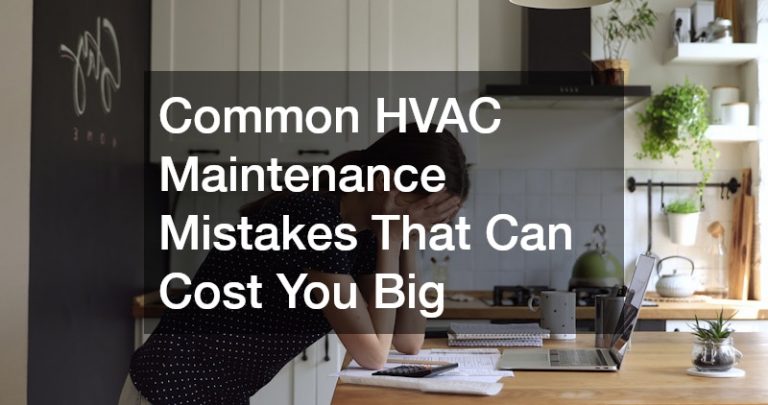Understanding HVAC maintenance is crucial for efficiency, longevity, and cost-saving. A well-maintained system not only ensures comfort but also protects your investment and reduces unexpected repair costs. Many homeowners, however, make mistakes that compromise performance, increase energy bills, and sometimes lead to full system replacement. From neglecting basic tasks to attempting DIY repairs, these missteps can be costly. This article explores common HVAC maintenance mistakes and offers practical guidance on how to avoid them, helping homeowners maximize the performance of their heating and cooling systems.
What Are The Most Common HVAC Maintenance Mistakes?
Proper maintenance is essential to keep your system running smoothly, yet homeowners often make preventable errors. These mistakes range from simple oversights, like failing to change air filters, to more technical issues, such as ignoring refrigerant levels. Understanding these missteps is the first step toward better system care.
Ignoring Regular Filter Changes
Air filters play a crucial role in your HVAC system by trapping dust, debris, and allergens. Failing to replace or clean them regularly can reduce airflow, forcing your system to work harder and consume more energy. AC companies emphasize that even a small buildup can significantly impact efficiency, making filter changes one of the simplest yet most critical maintenance tasks.
Neglecting Annual HVAC System Inspections
Annual inspections by a qualified HVAC contractor help identify potential issues before they escalate into costly repairs. Many homeowners skip this step, assuming their system is functioning properly. Regular inspections ensure that components like coils, fans, and compressors remain in top condition and can prevent small problems from becoming major breakdowns.
Overlooking Thermostat Settings
Thermostats are often underestimated in HVAC maintenance. Incorrectly set or malfunctioning thermostats can lead to uneven temperatures, higher energy bills, and greater strain on the system. Even smart thermostats require occasional checks to ensure they accurately reflect your heating and cooling needs.
Not Cleaning Air Ducts
Air ducts carry conditioned air throughout your home, and over time, dust, debris, and allergens accumulate. Neglecting duct cleaning can lead to reduced airflow and diminished indoor air quality. Engaging a professional duct cleaning company periodically can restore efficiency and help maintain a healthier home environment.
Failing to Check Refrigerant Levels
Refrigerant is essential for cooling performance, and low levels can significantly affect efficiency. Homeowners who ignore this aspect risk higher energy consumption, poor cooling, and potential damage to critical components like compressors. Certified technicians should always handle refrigerant checks to ensure system safety and compliance with environmental standards.
How Can Failing To Replace Filters Affect Your HVAC System?
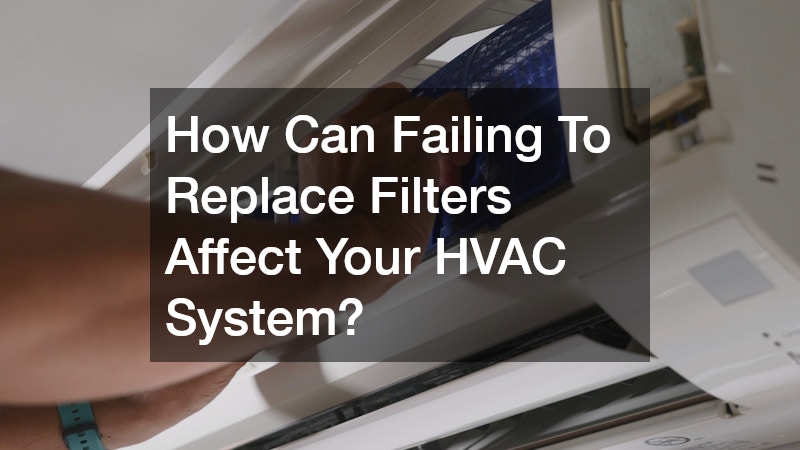
Filters are the first line of defense in any HVAC system. Ignoring them has consequences that go far beyond simple discomfort.
Decreased System Efficiency
Dirty filters restrict airflow, forcing your HVAC system to work harder. Over time, this reduces efficiency, requiring more energy to maintain the desired temperature. AC repair professionals often report that clogged filters are a leading cause of decreased system performance.
Increased Energy Bills
When the system works harder due to restricted airflow, electricity usage spikes. Homeowners may notice sudden increases in energy bills without realizing the source is a neglected filter. Local AC repairs frequently resolve this issue by replacing filters and restoring proper airflow.
Poor Indoor Air Quality
Airborne contaminants, allergens, and dust accumulate when filters are dirty, reducing indoor air quality. This can exacerbate respiratory conditions and trigger allergies, making clean filters essential for a healthy home environment.
Greater Wear And Tear On System Components
Restricted airflow puts stress on fans, coils, and compressors. Over time, this leads to premature wear, more frequent breakdowns, and costly repairs. Regular filter changes prevent unnecessary strain on these vital components.
Potential For System Overheating
An overworked system can overheat, triggering emergency shutdowns or permanent damage. AC repair services often find that a simple filter replacement resolves overheating issues without the need for more invasive repairs.
Why Is Regular Professional Inspection Necessary?
Professional inspections ensure that your HVAC system operates safely and efficiently. Skipping them can result in overlooked problems that escalate quickly.
Identifying Potential Issues Early
Certified HVAC contractors can spot minor issues before they become major problems. Early detection prevents costly repairs and ensures your system remains reliable throughout the year.
Extending System Lifespan
Routine inspections, coupled with professional maintenance, help extend the life of your HVAC system. By addressing wear and tear proactively, you avoid premature replacement and protect your investment.
Ensuring System Safety
Heating repair and cooling systems involve high voltage and combustible materials. A professional inspection ensures that safety standards are met, preventing fires, electrical hazards, or carbon monoxide leaks.
Boosting Performance Efficiency
A well-maintained system performs optimally, consuming less energy and maintaining consistent indoor comfort. HVAC companies emphasize that inspections improve system efficiency, saving money and enhancing performance.
Compliance With Warranty Requirements
Many HVAC warranties require professional maintenance to remain valid. Skipping annual inspections can void coverage, leaving homeowners responsible for expensive repairs that might otherwise be covered.
What Are The Risks Of DIY HVAC Maintenance?
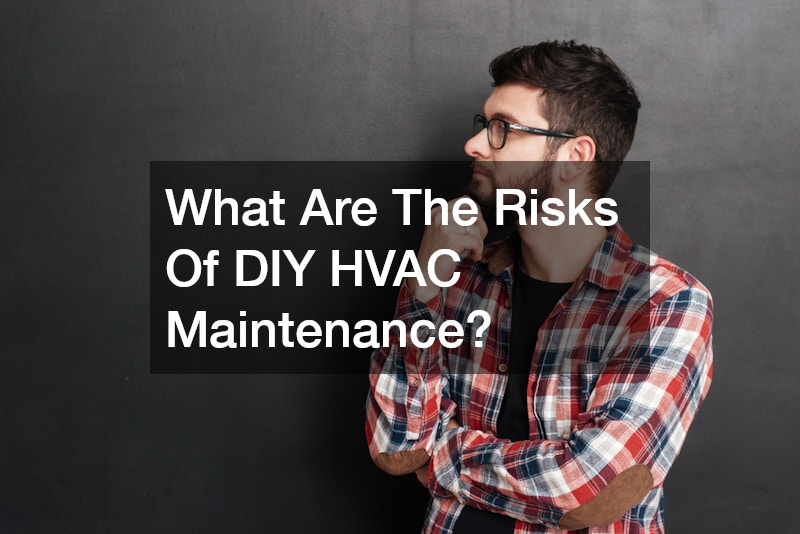
While DIY projects are tempting, HVAC systems involve complex components that require specialized knowledge. Attempting maintenance without proper expertise can backfire.
Lack Of Proper Tools
HVAC maintenance often requires specialized tools and diagnostic equipment. Without them, even simple tasks can be improperly executed, reducing system efficiency or causing damage.
Safety Hazards
Electricity, refrigerants, and moving components pose serious risks. Electrical technicians warn that attempting DIY repairs without safety precautions can result in injury or property damage.
Potential For Increasing Damage
Incorrect repairs or maintenance can exacerbate existing problems. Local AC repairs frequently involve correcting mistakes made during DIY attempts, sometimes costing more than professional intervention would have.
Violating Warranty Conditions
Most HVAC warranties specify that only certified professionals should perform certain maintenance tasks. DIY repairs can void coverage, leaving homeowners financially responsible for repairs that would otherwise be covered.
Missing Critical Issues
Nonprofessionals may overlook subtle but important signs of system malfunction. Regular inspections by a licensed HVAC contractor catch issues that the untrained eye might miss, ensuring system reliability.
How Can Neglecting Duct Cleaning Impact Your Home?
Air ducts are essential for distributing heated or cooled air throughout every room in your home, ensuring consistent temperature and comfort. They act as the main pathways for airflow, and any blockages, dust buildup, or leaks can significantly reduce the system’s efficiency. Neglecting their maintenance not only affects comfort but can also increase energy consumption, contribute to poor indoor air quality, and create conditions where mold and allergens thrive, leading to both health risks and higher utility costs.
Reduced Airflow
Accumulated dust and debris reduce airflow, causing your system to work harder. This inefficiency increases energy consumption and reduces overall comfort.
Accumulation Of Dust And Debris
Without regular cleaning, ducts become a repository for dust, hair, and other particles. These contaminants can spread throughout your home, creating an unhealthy environment.
Increased Allergens
Allergens, pollen, and other irritants build up in unclean ducts. Residents may experience worsened allergy symptoms or respiratory issues, emphasizing the need for professional duct cleaning company services.
Mold Growth Risks
Moisture and organic debris in ducts create the perfect environment for mold. Mold spores can circulate throughout the home, posing serious health risks.
Lower Energy Efficiency
Dirty ducts force the HVAC system to consume more energy to maintain temperatures. This leads to higher utility bills and premature system wear.
Why Is Adjusting Thermostat Settings Incorrectly A Problem?
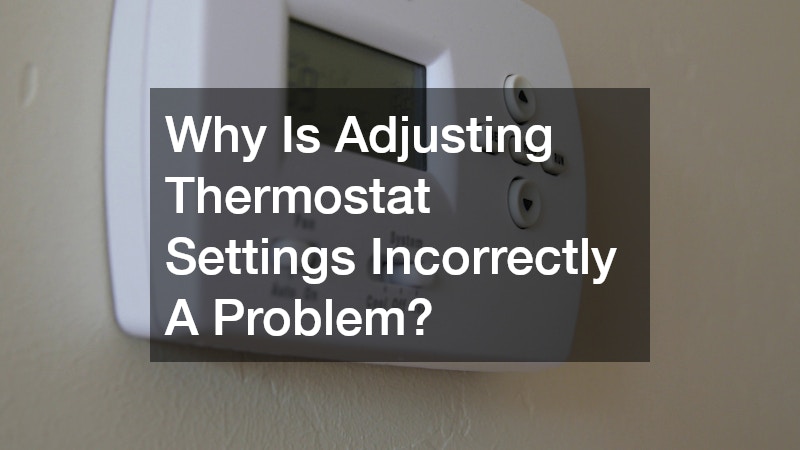
Thermostats control system operation, and improper settings can cause numerous issues, including higher energy bills, inconsistent comfort, and increased system wear over time.
Higher Utility Bills
Overheating or overcooling the home wastes energy, driving up electricity costs. Homeowners often overlook this simple but impactful factor.
Inconsistent Home Comfort
Incorrect thermostat settings result in uneven temperatures across rooms, leaving some areas uncomfortably warm while others remain too cold. This imbalance can make certain spaces less usable and force the HVAC system to work harder to try to compensate, ultimately increasing energy consumption and placing additional strain on system components.
Greater System Strain
Frequent temperature swings increase wear on system components, leading to more frequent repairs and shorter equipment lifespan.
Inefficient Energy Use
HVAC companies highlight that maintaining a steady, appropriate thermostat setting is key to energy efficiency.
Shortened System Lifespan
Constant adjustments and extremes in temperature can reduce the overall life of the system, increasing the need for early replacement.
What Should You Know About The Impact Of Closing Air Vents?
Many homeowners close vents to save energy, believing it will reduce heating or cooling costs, but this practice can have negative consequences. Blocking airflow disrupts the balance of the HVAC system, causing pressure buildup in the ducts, uneven room temperatures, and increased strain on critical components. Over time, this can reduce system efficiency, increase energy bills, and even lead to costly repairs.
Uneven Room Temperatures
Closed vents disrupt airflow, causing certain rooms to be warmer or cooler than intended, reducing comfort.
Increased System Pressure
Blocking airflow increases pressure within ducts, forcing the system to work harder and increasing the risk of component failure.
Potential Damage To Components
Fans, compressors, and other parts can be damaged by sustained pressure changes, requiring AC repair or replacement.
Reduced Efficiency
Blocked vents compromise efficiency, leading to higher energy usage and unnecessary strain on the system.
Increased Noise Levels
Pressure changes can cause whistling or rattling noises in ductwork, creating disturbances and indicating stress on the system.
How Does Ignoring Refrigerant Levels Affect System Performance?
Refrigerant is vital for the cooling cycle, and neglecting its levels can have serious repercussions.
Loss Of Cooling Capacity
Low refrigerant levels reduce the system’s ability to cool effectively, leaving the home uncomfortable during hot months.
System Freezing
Insufficient refrigerant can cause coils to freeze, stopping airflow and potentially damaging the compressor.
Increased Energy Consumption
The system works harder to compensate for low refrigerant, driving up energy bills and reducing efficiency.
Potential For Compressor Damage
Compressor failure is one of the costliest HVAC repairs. Maintaining proper refrigerant levels protects this critical component.
Environmental Impact
Leaking refrigerants contribute to greenhouse gas emissions. Certified HVAC contractors handle refrigerants safely, preventing environmental harm.
What Are The Consequences Of Improper System Sizing?
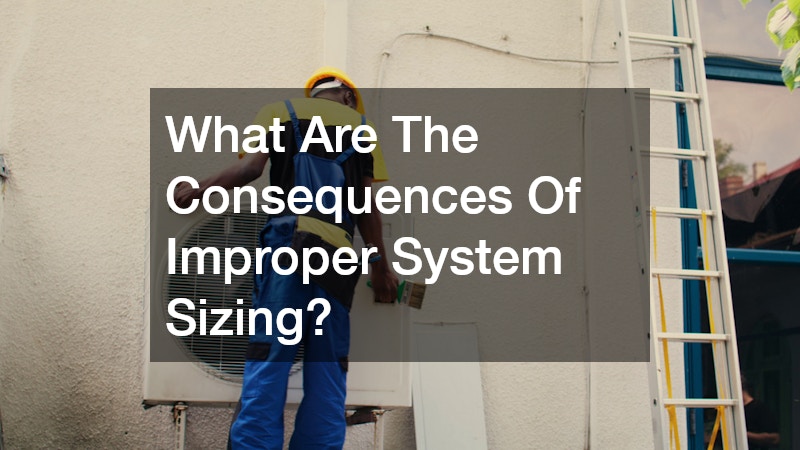
Selecting the correct HVAC system size is critical for efficiency and comfort. An improperly sized system leads to multiple issues.
Frequent On/Off Cycling
Undersized systems run continuously, while oversized systems cycle on and off frequently. Both scenarios strain components and reduce efficiency.
Inadequate Home Comfort
Incorrect sizing results in inconsistent temperatures and humidity control, leaving rooms uncomfortable.
Shortened System Life
Constant cycling or overexertion reduces the lifespan of system components, increasing the likelihood of repairs and replacement.
Higher Energy Costs
Oversized or undersized systems consume more energy, driving up utility bills despite achieving suboptimal comfort levels.
Increased Humidity Levels
Improperly sized systems fail to manage humidity effectively, creating conditions conducive to mold growth and indoor air quality issues.
Why Is It Important To Monitor HVAC Sounds?
Unusual sounds often indicate underlying problems. Regularly listening to your system can prevent serious damage.
Early Detection Of Issues
Rattling, grinding, or hissing sounds may signal loose components or refrigerant leaks. Early detection allows for timely repairs.
Preventing Further Damage
Addressing issues promptly prevents minor problems from escalating into major system failures, saving on costly AC repair.
Safety Hazards
Some sounds indicate electrical problems or overheating, posing safety risks. Electrical technicians emphasize the importance of prompt attention to unusual noises.
Maintaining Optimal Performance
Sound monitoring ensures all components function correctly, preserving energy efficiency and home comfort.
Prioritizing Repairs
Identifying issues early helps homeowners schedule necessary HVAC maintenance and allocate resources effectively, avoiding emergency situations.
Regular, proper maintenance can prevent costly mistakes and ensure your HVAC system runs efficiently and effectively. From changing filters to scheduling annual inspections with HVAC companies, addressing common errors proactively safeguards your investment and can even support your property insurance coverage by reducing the risk of claims related to system damage. Neglecting duct cleaning, refrigerant checks, thermostat adjustments, or system sizing can lead to higher energy bills, reduced comfort, and premature equipment failure. By relying on professional AC repair services, certified electricians, and knowledgeable HVAC contractors, homeowners can maintain optimal system performance, extend equipment lifespan, and enjoy a safer, more comfortable living environment. Understanding the importance of each maintenance step and avoiding common missteps ensures your HVAC system delivers reliable heating and cooling for years to come, all while protecting your home and reducing unnecessary expenses through diligent care.
